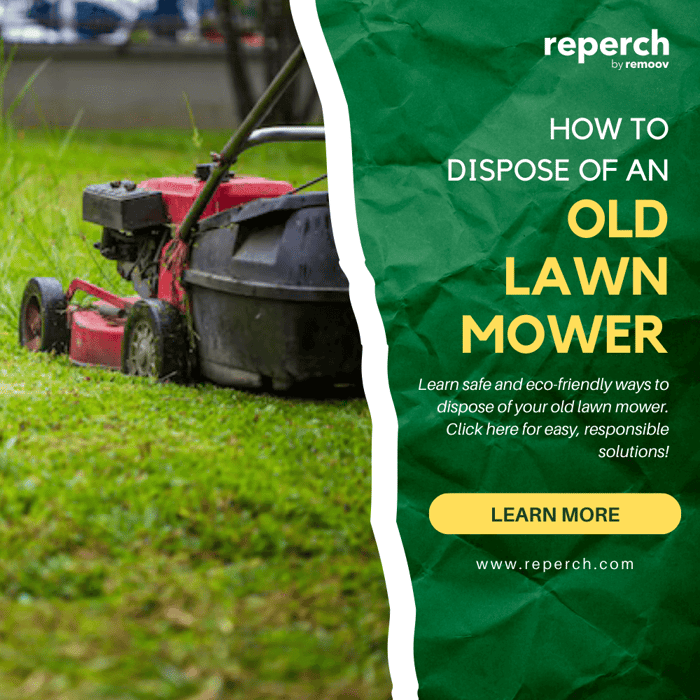Properly disposing of an old lawn mower is crucial for protecting the environment and freeing up valuable space in your garage or shed. Whether your lawn mower is broken, outdated, or you’ve upgraded to a more efficient model, understanding the right disposal methods ensures both safety and sustainability. From recycling to donation, this guide will walk you through every step to dispose of your old lawn mower safely and responsibly.
Why Is Proper Lawn Mower Disposal Important?
Lawn mowers are composed of materials like metal, plastic, and sometimes hazardous fluids like gasoline and oil. Improper disposal can lead to environmental damage, health risks, and even legal penalties in areas with strict waste regulations. By disposing of your lawn mower correctly, you contribute to resource conservation, reduce landfill waste, and help create a cleaner, greener planet.
Steps to Prepare Your Lawn Mower for Disposal
Before you dispose of your lawn mower, it’s essential to prepare it correctly. This step ensures safety for you, the environment, and anyone handling the mower during transportation or disposal.
1. Drain Gasoline and Oil
Use a siphon pump or hose to extract gasoline from the mower’s tank. Store the fuel in a certified container for later use or dispose of it at a hazardous waste facility.
Tilt the mower carefully and drain the oil into a suitable container. Many auto repair shops or recycling centers accept used motor oil for free.
2. Disconnect the Spark Plug
For safety, disconnect the spark plug to prevent accidental activation during handling or disassembly.
3. Remove and Sort Parts
Metal and Plastic: Separate the metal parts from the plastic components. Metal is highly recyclable, while some plastics may require specialized recycling facilities.
Blades and Engine: Remove the blades and engine for easier recycling or disposal. Handle blades with care and wear gloves to avoid injuries.
Eco-Friendly Ways to Dispose of an Old Lawn Mower
1. Recycling
Recycling is one of the most environmentally friendly ways to dispose of your lawn mower. Recycling centers accept metal, plastic, and other materials found in lawn mowers.
Drop-Off Recycling Centers: Find a local recycling facility that accepts lawn mowers. Check with your city’s waste management department for recommendations.
Scrap Yards: If your mower is primarily metal, scrap yards will likely accept it, and you may even earn money for the metal.
2. Donation
If your lawn mower is still functional, consider donating it to a charity or organization that can put it to good use.
Charities: Habitat for Humanity ReStores often accept gently used lawn mowers for resale or donation to families in need.
Community Organizations: Check with local community centers, schools, or gardening clubs that may need a lawn mower.
3. Selling or Gifting
A working lawn mower still has value and can be sold or gifted.
Online Platforms: Use platforms like Facebook Marketplace, Craigslist, or eBay to find a buyer.
Garage Sales: Include the mower in your next yard sale to attract local buyers.
Friends and Family: Ask around to see if someone in your circle could use a mower.
4. Professional Junk Removal Services
Hiring a junk removal service is an excellent option if your mower is non-functional or you don’t have the means to transport it. These services handle everything from pickup to recycling, ensuring safe disposal.
Disposing of Special Types of Lawn Mowers
Electric Lawn Mowers
Electric mowers fall under the category of e-waste. They contain batteries and electronic components that need special handling.
Battery Removal: Remove and recycle the battery at an e-waste recycling center.
E-Waste Facilities: Drop off the electric components at a certified e-waste recycling center.
Riding Lawn Mowers
Riding mowers are bulkier and require additional steps for disposal.
Break Down the Mower: Separate the large components like the seat, deck, and wheels for easier transportation.
Recycle: Take the metal and plastic parts to a recycling facility. Contact your local waste management provider for help with the larger engine components.
How to Dispose of Hazardous Materials
Gasoline, oil, and batteries from your lawn mower must be handled with care. Here’s how:
Gasoline: Store leftover gas in a certified container and take it to a hazardous waste disposal site.
Oil: Many auto shops and recycling centers accept used motor oil.
Batteries: Drop off mower batteries at e-waste facilities, automotive stores, or specialized recycling centers.
Why Recycling Is Better Than Landfilling
Recycling old lawn mowers reduces the strain on landfills and conserves valuable resources. Metal and plastic components can be repurposed into new products, while hazardous materials like oil and gas are safely disposed of, preventing environmental contamination.
When to Consider Professional Help
Sometimes, the effort to dispose of a lawn mower on your own isn’t feasible. If you lack transportation or need to dispose of multiple items, professional junk removal services are your best bet. Companies like Remoov? offer reliable, eco-friendly disposal options.
Key Safety Tips for Lawn Mower Disposal
Always wear protective gloves and safety glasses when handling sharp parts or hazardous materials.
Store removed fluids in secure, labeled containers away from heat or flame.
Use tools like screwdrivers and wrenches to disassemble the mower safely.
Keep the lawn mower out of children’s reach during the disposal process.
FAQs on Lawn Mower Disposal
Can I leave my old lawn mower on the curb for trash pickup?
Some municipal waste services accept lawn mowers, but you’ll need to remove fluids first. Contact your local service provider to confirm.
How much can I get for scrapping my lawn mower?
The value depends on the amount and type of metal. Scrap yards typically pay for steel and aluminum components.
Can I donate a broken lawn mower?
Most organizations only accept working lawn mowers. However, some repair-focused charities might take broken models.
Are electric lawn mowers easier to recycle than gas mowers?
Yes, as they don’t contain hazardous fluids. However, their batteries must be disposed of separately as e-waste.
Final Thoughts
Disposing of an old lawn mower doesn’t have to be a stressful or wasteful process. By choosing recycling, donation, or professional services, you can responsibly say goodbye to your old machine while protecting the environment. Taking the extra steps to handle hazardous materials safely ensures that you’re doing your part for a cleaner planet.
Ready to reclaim your space and make an eco-friendly choice? Explore local recycling centers, donate to a charitable organization, or hire professionals to take care of the heavy lifting. Every effort counts!
Get more tips and guides on sustainable living at Reperch today!








